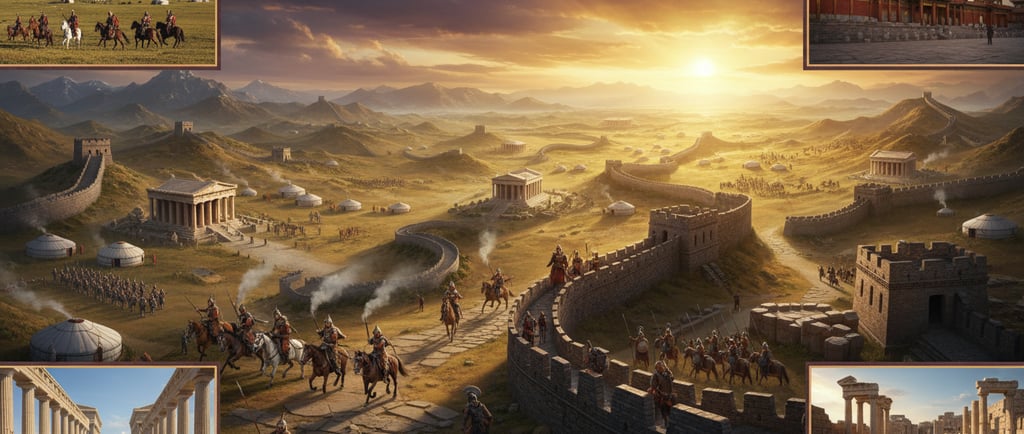Genghis Khan Or Alexander the Great
Genghis Khan Vs Alexander the Great, Who was more powerful and Greatest hero of the time.


His Birth Name: He was born around 1162 and named Temüjin, after a chieftain his father had captured. The title "Genghis Khan" means "Universal Ruler" and was bestowed upon him later when he united the Mongol tribes.
A Childhood of Hardship: His father was poisoned when he was nine, leaving his family destitute. They were abandoned by their tribe, and Temüjin even killed his own half-brother in a fight over resources, showing his fierce will to survive.
Unifier of Mongolia: Before him, the Mongolian plateau was a land of fractious and warring nomadic tribes. Through a combination of alliances, diplomacy, and conquest, he unified all these tribes into a single nation for the first time in history.
A Meritocratic Leader: Unlike his contemporaries, Genghis Khan promoted military officers based on skill and merit, not noble birth. This allowed talented individuals from humble backgrounds, like his famed general Subutai, to rise to the highest ranks.
Master of Psychological Warfare: He used terror as a calculated strategy. If a city resisted, his forces would often massacre the entire population. This psychological tactic caused many other cities to surrender without a fight, saving his army time and resources.
Pioneer of the "Pax Mongolica": After the initial conquests, his empire established a period of stability known as the Pax Mongolica ("Mongol Peace"). This secured the Silk Road, allowing for unprecedented safe trade and cultural exchange between Asia and Europe.
Religious Tolerance: Despite his brutality in war, Genghis Khan was remarkably tolerant of different religions. He passed laws declaring complete religious freedom for all and often consulted with Muslim, Christian, Buddhist, and Taoist leaders.
The Yassa Legal Code: He created a universal legal code called the Yassa. It established laws, outlawed petty theft and adultery, standardized measurements, and protected merchants. It was a key tool for administering his vast, diverse empire.
Mysterious Death: He died in 1227 during a military campaign against the Western Xia dynasty. The exact cause of his death remains a mystery, with theories ranging from battle wounds to illness. His burial site was kept a secret and remains lost.
The Largest Contiguous Empire: At its peak, the Mongol Empire founded by Genghis Khan became the largest contiguous land empire in history, stretching from the Pacific Ocean to the Caspian Sea.
GENGHIS KHAN
ALEXANDER THE GREAT
Student of Aristotle: From the age of 13, Alexander was tutored by the legendary philosopher Aristotle, who instilled in him a love for knowledge, medicine, philosophy, and scientific inquiry.
Tamed Bucephalus: At age 12, he famously tamed a wild stallion that no one else could handle, naming it Bucephalus. The horse would carry him through nearly all his major battles until its death in 326 BC.
The Gordian Knot: In the city of Gordium, he encountered a legendary knot tied to a wagon. An oracle promised rule over Asia to whoever could untie it. Instead of untying it, Alexander sliced it in half with his sword—a bold, direct solution that became a legend.
Undefeated in Battle: Across 15 years of constant campaigning and numerous major battles (Granicus, Issus, Gaugamela, Hydaspes), Alexander never lost a single battle against often vastly larger armies.
Founded Many Cities: He founded over 20 cities bearing his name, the most famous being Alexandria in Egypt, which became a major center of Hellenistic culture and learning, housing the legendary Library of Alexandria.
Adopted Persian Customs: To consolidate his rule, he shocked his Macedonian soldiers by adopting Persian dress, integrating Persian soldiers into his army, and holding a mass wedding where he and his officers married Persian noblewomen.
Reached the End of the Known World: His army marched over 22,000 miles. They pushed east until they reached the Beas River in India (modern-day Punjab), where his exhausted troops, after facing war elephants, refused to go further.
Mysterious Death: He died in Babylon in 323 BC at the age of 32. The cause remains one of history's great mysteries, with theories ranging from malaria or typhoid fever to poisoning.
A Global Legacy: His conquests created the Hellenistic Period, a fusion of Greek, Persian, Egyptian, and Indian cultures that spread Greek ideas, art, and language across the known world for centuries.
A Model for Generals: His innovative tactics, especially the use of the combined-arms "hammer and anvil" maneuver, made him a legendary military figure whose strategies were studied by later generals from Caesar to Napoleon.
